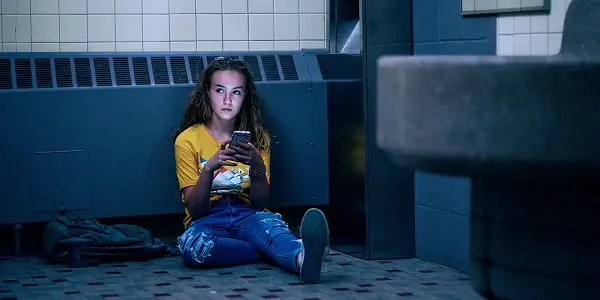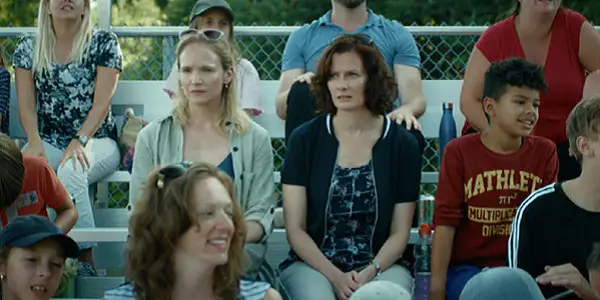LES NÔTRES: Girlhood, Interrupted

Lee Jutton has directed short films starring a killer toaster,…
Small-town scandal plus coming-of-age drama has to be one of the most popular genre-mashups in the history of cinema, right? People never seem to grow tired of seeing the rot below the surface of perfectly manicured lawns exposed to the bright light of day — oh, and if there’s a pretty young girl involved with ugly things, that’s even better.
I’m not trying to be overly critical of these kinds of films; after all, one of my favorite television shows is the eccentric uncle of them all, Twin Peaks. In fact, what I’ve noticed lately in the newer takes on these old tropes is more of an emphasis on the viewpoint of the girl who is often at the center of such stories, which can only be a good thing. Whereas before she was treated almost like an object, someone to whom things happen so that those around her can experience an emotional awakening, she now has more agency and the opportunity for an awakening of her own.
Les Nôtres (which translates in English to Our Own) tells one such story, featuring one such girl. Directed by Jeanne Leblanc from a script by Leblanc and Judith Baribeau, it chronicles the upheaval that occurs in a close-knit Québécois town after a young girl becomes pregnant. Starring the remarkable young actor Émilie Bierre, Les Nôtres reminds us that the darkest and most deeply hidden of our secrets will always find a way to the surface, no matter how many layers of sunshine and smiles we try to shovel over them.
What Lies Beneath
Magalie Jodoin (Bierre) is a 13-year-old girl growing up in the small town of Sainte-Adeline, where everyone knows everything about everyone — or, at least, they think they do. Magalie’s father passed away in a tragic accident at the local factory; her mother, Isabelle (Marianne Farley) is in charge of efforts to build a memorial park on the site of the accident to commemorate what was Sainte-Adeline’s greatest tragedy. However, something else soon happens that sends the entire town reeling: Magalie is pregnant.
Magalie’s friends and family suspect the father to be a mysterious phone contact known as “Taz” whose identity Magalie won’t reveal, not even to the kindly social worker (Guillaume Cyr) who attempts to relate to her by telling the story of how he became a father at the age of 15. Many suspect that “Taz” is Manu (Léon Diconca Pelletier), a classmate and close friend of Magalie’s. Manu is Mexican — the foster son of the town’s mayor and his wife — and the notion that Manu may have impregnated the beautiful blonde Magalie brings out the most racist impulses in this predominantly white community.

While those around Magalie remain in the dark, the audience learns all too quickly who “Taz” really is: an adult man in the community whose identity I won’t spoil here. Magalie could out him as a dangerous pedophile, though the revelation would likely ravage the small community beyond repair. Instead, she puts up with the whispered rumors and insults, which increase in volume and cruelty as her stomach expands. That the entire town immediately blames a teenage girl for getting pregnant, as though the situation were entirely her fault for being “too easy” or “a slut,” is disappointing but not surprising to anyone who remembers how teen bride Courtney Stodden was ridiculed for being groomed by their adult husband, subject to abusive vitriol instead of the sympathy and concern they needed.
It’s such a tricky, terrible situation for a young girl to be in that when Magalie decides to frame someone else as the father in order to put a halt to the gossip, one is both disturbed by her disregard for someone else’s reputation and sympathetic towards her misguided attempts at self-preservation. In those moments, it’s never more clear that 13 years old is far too young to become responsible for someone else; at that age, you don’t necessarily even know what’s best for yourself.
Disturbia
Les Nôtres begins strong, focusing on the crisscrossing relationships between the town’s characters and the enigmatic nature of Magalie, who speaks far more with her eyes than her words. Leblanc builds suspense by slowly revealing bits and pieces about the people of Sainte-Adeline, showing rather than telling us who they are, what they value, and what they’re hiding. Cinematographer Tobie Marier-Robitaille (who also shot one of the best movies in recent memory, Philippe Lacôte’s Night of the Kings) captures the grotesque contrast between the sun-dappled streets of Sainte-Adeline and the ghastly glow of the computer screen where Magalie covertly chats with “Taz,” those two locations perfectly symbolizing the two sides to Magalie’s life.

Pretty, popular, and a member of a competitive dance troupe, Magalie does remind one of Twin Peaks’ Laura Palmer, who concealed her trauma from those around her by taking on as many community activities as she could handle. Bierre, winner of Best Actress at the 2019 Canadian Screen Awards for her role in A Colony, portrays this multifaceted teenage girl as exactly that — a teenage girl, too young to be put in this situation but also too old to be fully controlled by the adults around her anymore. That includes the father or her baby, who would naturally prefer Magalie terminate the pregnancy and eliminate all evidence of his crimes; Magalie refuses, all too late realizing that the man who calls her his princess is more of a villain than a knight in shining armor. Bierre’s performance is also a prime example of why casting actual teenagers to play teenagers is far better and more believable than when twenty-somethings try to masquerade as many years younger; when your film revolves around the drama of a young girl getting pregnant, the emotional impact is so much greater (and more horrifying) when the actor still looks like a child herself.
While it is her performance that serves as the film’s lodestar, Bierre is also surrounded by a competent supporting cast, including Farley as Magalie’s mother and Judith Baribeau, the film’s co-writer, as the wife of Sainte-Adeline’s mayor. I would have preferred more screen time for Léon Diconca Pelletier’s Manu, whose character serves an important role in the story but feels rather undeveloped. It almost feels like he was only there to give the other characters an excuse to expose their racism, as though Leblanc and Baribeau decided their original scenario didn’t have enough inherent drama. (As if!) Yet Pelletier does a great deal with the little screen time that he has, showing us the pain of being celebrated for one’s talents while still being demeaned as “not one of us.”
Les Lessource: Oscilloscope LabsUnfortunately, Les Nôtres takes a turn for the overly melodramatic in the latter half, around the time Magalie decides to frame someone else as the father of her baby. Before this occurs, the film still feels painfully realistic; afterward, it feels as though the remaining story beats were cribbed from a soap opera script. (And even a soap opera would tell you that there are tests that can easily prove whether or not someone is the father of an unborn baby before forcing them to face the consequences of their supposed actions.) Perhaps the decision was made to take the fastest action possible, rather than stretch out the affair and expose the people involved to more gossip — goodness knows the folks of Sainte-Adeline love gossip — but that doesn’t make the entire situation feel any less ridiculous. Fortunately, the capable cast manages to make even the film’s more inexplicable moments into something worth watching.
Conclusion
By the time Les Nôtres arrives at its odd open ending, the film’s early intensity has tapered off into something less satisfying. Still, like so many similar movies before it, it’s all too easy to get sucked into the twisted, tangled drama of this town.
What do you think? What are your favorite small-town dramas? Share your thoughts in the comments below.
Les Nôtres opens in the U.S. on June 18, 2021
Does content like this matter to you?
Become a Member and support film journalism. Unlock access to all of Film Inquiry`s great articles. Join a community of like-minded readers who are passionate about cinema - get access to our private members Network, give back to independent filmmakers, and more.
Lee Jutton has directed short films starring a killer toaster, a killer Christmas tree, and a not-killer leopard. Her writing has appeared in publications such as Film School Rejects, Bitch: A Feminist Response to Pop Culture, Bitch Flicks, TV Fanatic, and Just Press Play. When not watching, making, or writing about films, she can usually be found on Twitter obsessing over soccer, BTS, and her cat.













